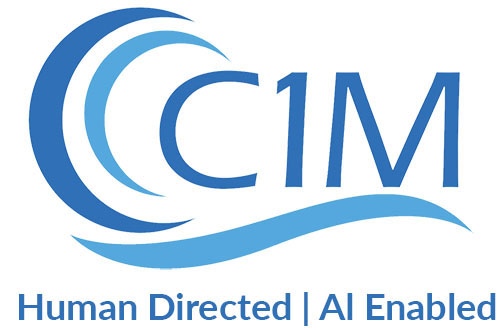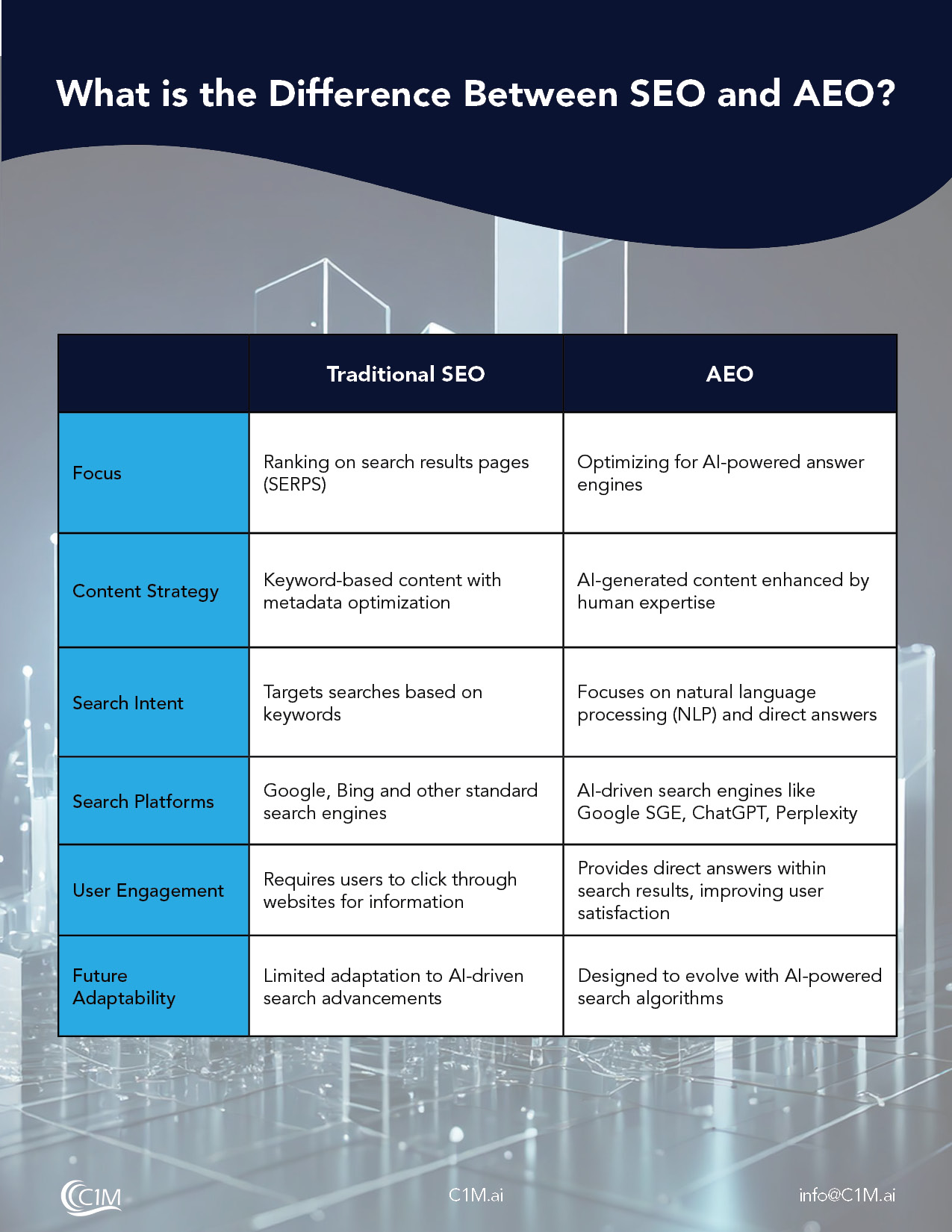
The year 2023 was considered a breakout year for the use of AI in business processes, and this evolution shows no signs of slowing down. According to an article by the MIT Sloan School of Management, 6% of companies used artificial intelligence or AI technology in some aspects of their business operations in 2017. While data collection for modern business AI use today varies (and is growing daily), more than half of all companies rely on AI technology for at least some aspect of their operations, from data analytics to eliminating manual tasks.
The good news is – it’s working. According to a Harvard Business Review report, companies that pioneered the use of AI reported an average cost savings of 40-60%, a reduction in call times by 60-70%, and a 50% increase in customer leads and sales.
Implementing an AI strategy for your business
Clearly, in the business world, the future is trending towards routine use of artificial intelligence in business operations. Therefore, now is the time to get on board to develop and maintain a competitive edge for your business.
Businesses that do not research how leveraging AI can enhance a comprehensive business management strategy are not only missing out on emerging AI-powered opportunities, but they may also be left behind when it comes to data analytics, modern and effective marketing strategies, and better customer relationship management.
Table of Contents
The Fundamentals of Artificial Intelligence
How Will AI Benefit Businesses?
What are the Four Pillars of an AI Strategy?
How to Create an AI Strategy for Your Company
How Can AI Help with Business Strategy?
In today’s rapidly evolving business world, integrating artificial intelligence into your organization’s operations is no longer an option – it’s a necessity. Incorporating artificial intelligence into your day-to-day routine is a significant changing endeavor for your company. Developing an AI strategy demands a deep understanding of machine learning algorithms and thoroughly exploring cutting-edge AI technologies and tools that align with your business’s unique needs.
Read on to uncover more about the best path forward for using artificial intelligence in business and how your business leaders can incorporate AI solutions to garner a competitive edge and streamline operations.
The fundamentals of artificial intelligence (AI)
The general definition of artificial intelligence (AI) is the technology that enables computers, systems, and other AI tools to mimic human intelligence and problem-solving capabilities. When it comes to artificial intelligence in business, these technologies can be further broken down into natural language processing (NLP), machine learning (ML), and deep learning. Therefore, when all these technologies are combined, they enhance business functions.
A breakdown of natural language processing, machine learning, and deep learning is as follows.
Natural language processing
Natural language processing is a branch of artificial intelligence that allows AI systems to recognize, understand, and create text and speech functions. You’ll find natural language processing in everyday business functions, such as customer support chatbots, digital assistants, and even voice-activated GPS systems.
Machine learning
Machine learning algorithms are a subset of artificial intelligence orchestrated to make classifications or predictions based on customer input or other customer data. Over time, machine learning algorithms can use this growing data analysis to identify patterns and future trends, find anomalies, review market trends, or make predictions in broad areas such as sales revenue. Essentially, machine learning is an AI process that can extract meaningful insights for better decision making.
Deep learning
Deep learning is a subset of artificial intelligence that propels the automation of human tasks without human intervention. By analyzing big data sets of human and customer behavior, deep learning AI systems can predict future actions and behaviors and compared to machine learning, can more accurately extract valuable information from unstructured data such as text and images. Many applications use deep learning, including virtual assistants, customer service chatbots, facial recognition software, and fraud prevention technology.
How Will AI Benefit Businesses?
There are mostly limitless ways to use AI in business and countless AI tools to help launch these business AI applications. From improving customer interactions to eliminating time-consuming tasks, here are a few ways to incorporate AI into business strategies and operations.
Process Automation
Small businesses across all industries have routine and repetitive tasks, like inputting data, creating reports, or handling routine customer interactions and questions.
In fact, according to a 2021 survey of workers across various industries, more than two-thirds (67%) of respondents feel they are constantly doing the same tasks over and over again. In addition, 68% said they wish they had more time to explore how to incorporate new responsibilities into their day-to-day routines.
However, artificial intelligence can replace the human capabilities required to perform these simple and repetitive tasks, allowing your employees an escape from boredom and an opportunity to take on more advanced and challenging roles that artificial intelligence simply can’t accomplish.
Deep data analytics
Before the onset of artificial intelligence, analyzing customer data to garner customer insights was a lengthy and complex task with plenty of gaps.
Marketing pros could certainly analyze data like clicks on social media posts, customer feedback, accessible online info like Google data analytics, and customer satisfaction rates. However, this general customer data analysis did not create a complete picture.
Artificial tools can go even miles deeper when it comes to data analysis. With the ability to instantly dissect all variations of available data, AI tools can create detailed data analytics that covers all aspects of past customer behavior and use predictive analytics to further anticipate customer preferences and actions.
Imagine how effective your marketing campaigns could be if you had access to detailed predictive analytics of how to route customers from initial interest to the transaction stage of the sales process.
Simply put, having exceptional data analytics leads to better decision making across the board – from your inventory management to guidance for your customer service agents to marketing campaigns.
Better decision making
It bears repeating that artificial intelligence leads to better decision making at a leadership level in all facets of operations. Yes, data analytics that stems from customer experience is invaluable for your marketing and sales strategies. However, you also have access to employee data, and AI tools can help delve into this invaluable information. For example, what incentives resonated with motivating your sales teams? What business benefits are most valuable for your employees? Also, what dissatisfaction or issues should be flagged to your human resources team to resolve potential conflicts before they begin?
Essentially, when it comes to broad-stroke decision making that trickles down through your company, artificial intelligence tools are a huge resource in every way possible.
Content generation
One of the biggest misconceptions about artificial intelligences is the use and function of generative AI.
Generative AI is the driving force behind content creation, and it can be used for everything from customer service responses and social media posts to website content and press releases. Many newcomers to artificial intelligence believe that generative AI is designed to replace the roles of marketing teams and content creators, but this could not be further from the truth.
Instead, generative AI is a tool that enhances your ability to create meaningful content generation. Generative AI tools can certainly lay the groundwork for content in all forms by conducting research, creating an outline, or even crafting a “rough draft” of verbiage and text. However, the real purpose of generative AI is to serve as a building block to create better content across the board.
Marketing and sales
Predictive analytics and identifying the multiple and detailed steps of the sales route lead to more effective marketing and better revenue. AI tools use a wealth of historical data and economic indicators to identify a straightforward way to reach your target audience. They then filter them through the sales cycle until a transaction is made.
The ways that AI tools can boost marketing and sales are multi-faceted.
AI tools can be used to identify your target demographic and the triggers that grab their attention. They can provide a timeline of the sales cycle and identify opportunities to facilitate transactions much faster. Additionally, AI tools can even identify the methods and verbiage that best creates new customers, – such as e-campaigns, social media posts, or organic online searches.
Customer service
One of the most popular ways small businesses incorporate artificial intelligence into their business operations is through customer service, specifically conversational AI.
Again, there can be some misconceptions floating around this area of artificial intelligence. One of the most common concerns for small businesses is that transitioning to AI tools for customer service tasks will result in more negative customer experiences, as customers interact with an AI chatbot or other AI service instead of a human being.
However, this is definitively not the case. Multiple studies conducted over the past few years have revealed that customers have positive experiences and may even prefer AI chatbots when it comes to customer service queries. Moreover, IBM even reported a 99% customer satisfaction rate when it came to organizations using AI-based virtual agent technology.
Conversely, the human resources department reported an uptick in customer satisfaction regarding to customer interactions, as employees could perform new and more challenging roles instead of spending hours online or on the phone answering repetitive questions.
Simply put, there’s a reason why customer service AI technology is consistently used in business and is becoming the new normal. Available 24/7, conversational AI tools enhance the customer experience while eliminating repetitive tasks affecting a business’s revenue.
Cybersecurity
Another way that AI is used in business is by enhancing cybersecurity and fraud detection measures. Especially when it comes to industries that deal with sensitive information, like financial or healthcare data. By keeping constant tabs on data analytics and typical customer interactions and communications, AI tools designed for fraud detection and risk assessment can pinpoint red flags. It can also alert business leaders of potential fraud or data breach issues before they become a crisis. AI tools can also eliminate human error in everyday operations, one of the leading causes of cybersecurity threats and incidents across all industries.
What are the Four Pillars of an AI Strategy?
Once you successfully incorporate artificial intelligence into your operations, you’ll immediately see benefits across all business functions. But arguably, the most challenging part of using AI in business is integrating AI.
As such, it’s helpful to have a detailed plan before integrating AI into your business, which starts with the following foundational details.
Step 1: Assess current business needs and identify areas where AI can drive improvements
When it comes to your business functions, where will AI tools provide the most benefits? Do you spend a lot of time fielding emails, direct messages, and phone calls? Do you have an outdated website that is ignored by online search engines? The answers to these questions can be varied, but identifying your pain points is the first step to incorporating artificial intelligence tools.
Step 2: Define clear objectives and desired outcomes for AI Implementation
The key word here is “clear.” It should entail every detail, from timeline to ROI. Whether it’s reducing 4.5 hours of customer service time per week (the average time that AI customer service tools and virtual assistants save) or increasing social media followers by 20%, make sure your objectives are easy to define so you have an easier route to the goal lines.
Step 3: Evaluate AI solutions and select the right technologies aligned with your goals
Do a Google search for AI tools, and you’ll be flooded with options. Businesses use many AI solutions, and finding the best match for your business functions can be challenging. This is why an expert in AI solutions like C1M is a crucial resource. Our professional team can help you filter through the noise to find the best tailored solutions for your business.
Step 4: Develop a roadmap for AI integration and deployment
After completing the first three steps, step four should be easy to achieve. Be sure to consider all business-impacting considerations, including employee training, integration schedule, and monitoring of your ROI.
How to Create an AI Strategy for Your Company: Partnering with C1M for Enhanced Innovation
C1M is your best resource for starting the conversation on integrating artificial intelligence into your broad spectrum of business functions. Reach out to our AI experts today. We can help you build a foundation to integrate AI into your everyday operations.
If you’re at the forefront of artificial intelligence, regardless of your end goals or pain points, you’ll have a competitive edge that will enhance all aspects of your business.









